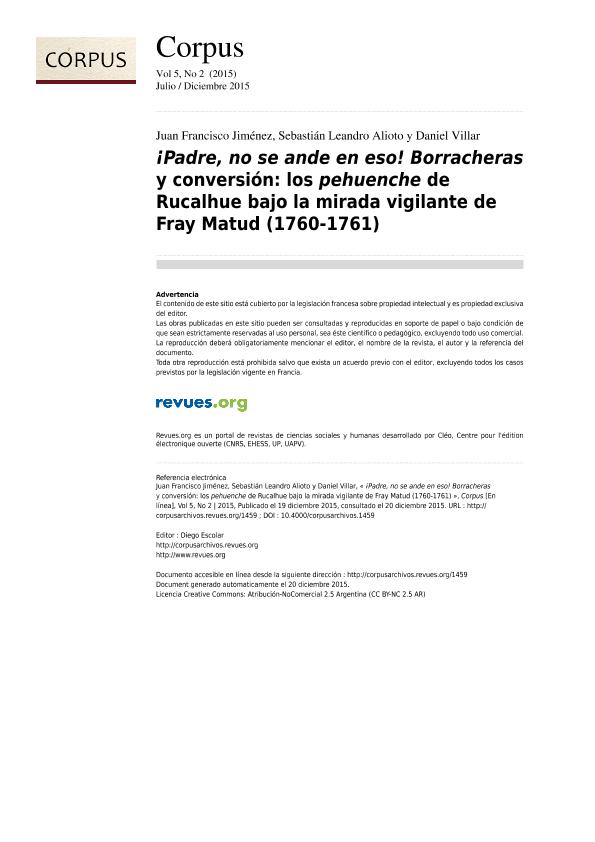Artículo
En 1761, el misionero franciscano Juan Matud envió un informe al gobernador del reino de Chile en el que reseñaba las actividades que, en los meses previos, había llevado a cabo en convivencia con los pehuenche del valle de Rucalhue. Allí, Matud había refundado una misión, la Purísima Concepción, próxima al lugar en que pocos años antes miembros de su misma orden instalaron otra que debió ser abandonada a causa de los rumores de rebelión indígena, destruida luego por un incendio. Ese documento inédito ?aquí reproducido‒ está actualmente incorporado al fondo del Colegio Apostólico de Misioneros de Chillán, en Santiago de Chile. Su contenido trasunta la manera en que los seráficos concebían la tarea evangelizadora y su percepción acerca de las costumbres indígenas, entre las que borracheras y poliginia constituían el mayor obstáculo que se oponía al progreso de aquella. El programa conversional, basado en la cercanía cotidiana de misioneros y neófitos, prescribía una intervención permanente dirigida a que se abandonasen prácticas que los catequistas consideraban inaceptables. Los nativos, a su vez, persuadidos de la conveniencia e irrenunciabilidad de las mismas, no estaban dispuestos a tolerar que personas extrañas, a las que no habían tenido a priori inconvenientes en recibir en su territorio, llevasen la intromisión al extremo de solicitar el auxilio armado de las autoridades fronterizas en su respaldo. La tensa situación creada por la obstinación de uno y la lógica irreductibilidad de otros se resolvió al fin en el alejamiento del misionero, revelador de las limitaciones ideológicas y metodológicasdel plan de acción de los seráficos y también de las razones de su generalizado fracaso. In 1761, the Franciscan missionary Juan Matud sent a report to the governor of the kingdom of Chile, in which he summarized the activities that, during the previous months, he had carried out in coexistence with the pehuenche of Rucalhue valley. There, Matud had re-founded a mission, the Purísima Concepción, near to the place where a few years earlier members of his own order had installed another one which had to be abandoned due to rumors of Indian rebellion, and destroyed later by a fire. That non-edited document –reproduced here‒ is now incorporated to de repository of Colegio Apostólico de Misioneros de Chillán, in Santiago de Chile. Its content shows the ways in which seraphics conceived the evangelizing duty and their perception about Indian customs, among which feasts (borracheras) and poliginy constituted the greatest obstacle to its progress. The conversional program based on quotidian proximity of missionaries and neophytes, prescribed a permanent intervention directed to the abandonment of practices which the catechists considered unacceptable. The natives, at the same time, persuaded of the convenience and irrevocability of those practices, were not willing to tolerate that strangers –who they had no problem to admit in their territories‒ took the intromission to the extreme of calling for frontier authorities´ armed help in their support. The tense situation created by the obstinacy of one and the irreducibility of the others was finally resolved with the missionary´s walking away, revealing the ideological and methodological limitations of the seraphic action plan, and the reasons of its generalized failure.
¡Padre, no se ande en eso! Borracheras y conversión: los pehuenche de Rucalhue bajo la mirada vigilante de Fray Matud (1760-1761)
Título:
¡Padre, no se ande en eso! Feasts and conversion: the pehuenche of Rucalhue under the watchful eye of Fray Matud (1760-1761)
Fecha de publicación:
12/2015
Editorial:
Diego Escolar
Revista:
Corpus
ISSN:
1853-8037
Idioma:
Español
Tipo de recurso:
Artículo publicado
Clasificación temática:
Resumen
Palabras clave:
Conversión
,
Franciscanos
,
Pehuenche
,
Borracheras
Archivos asociados
Licencia
Identificadores
Colecciones
Articulos(CCT - BAHIA BLANCA)
Articulos de CTRO.CIENTIFICO TECNOL.CONICET - BAHIA BLANCA
Articulos de CTRO.CIENTIFICO TECNOL.CONICET - BAHIA BLANCA
Citación
Jiménez, Juan Francisco; Alioto, Sebastián Leandro; Villar, Daniel; ¡Padre, no se ande en eso! Borracheras y conversión: los pehuenche de Rucalhue bajo la mirada vigilante de Fray Matud (1760-1761); Diego Escolar; Corpus; 5; 2; 12-2015; 1-21
Compartir
Altmétricas




